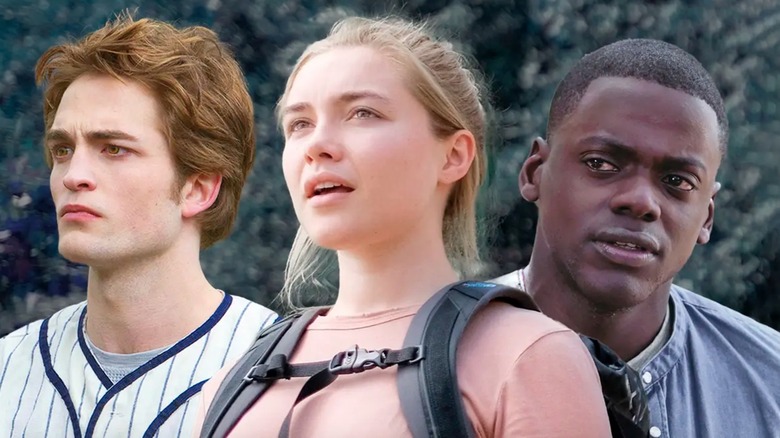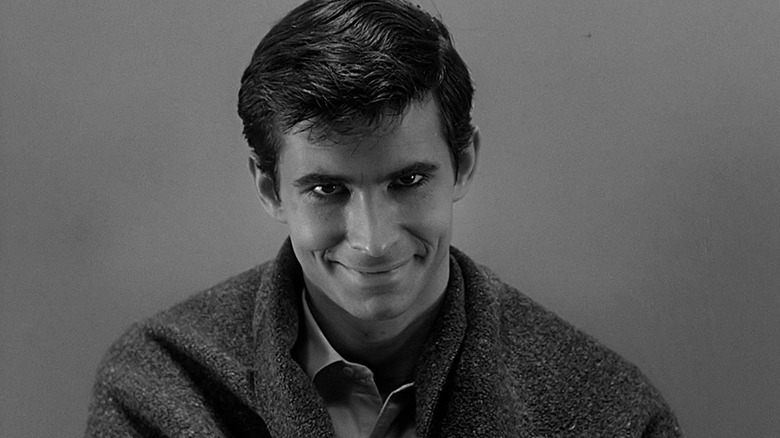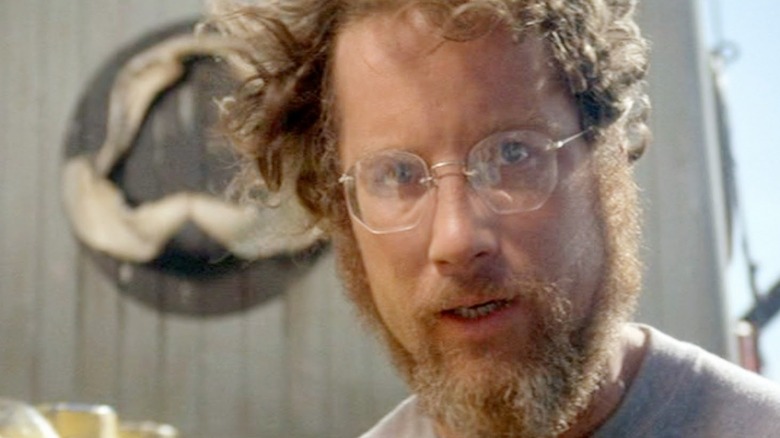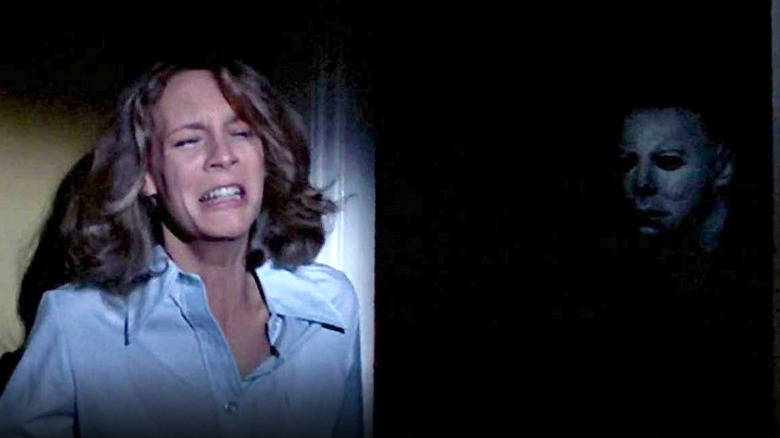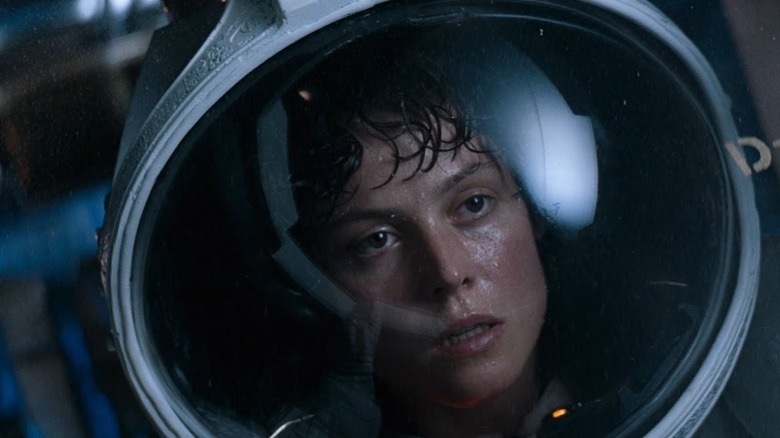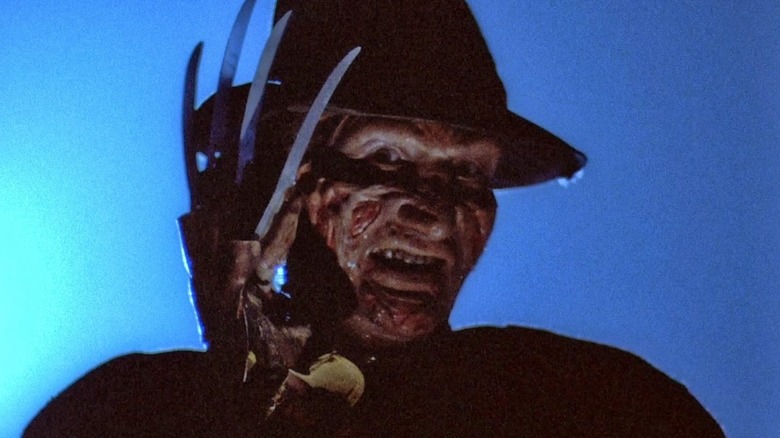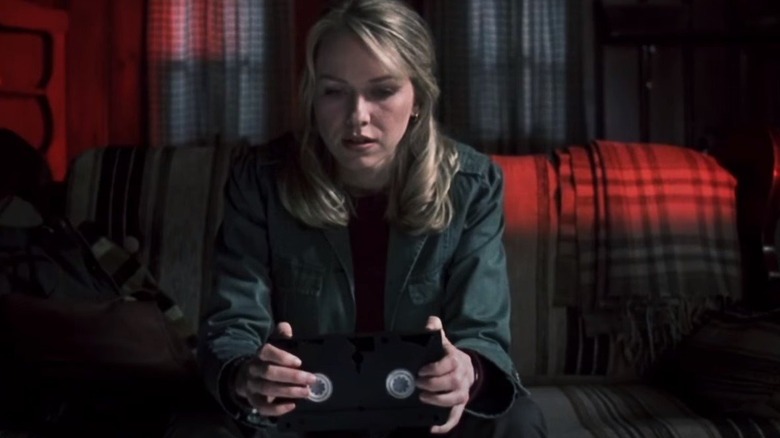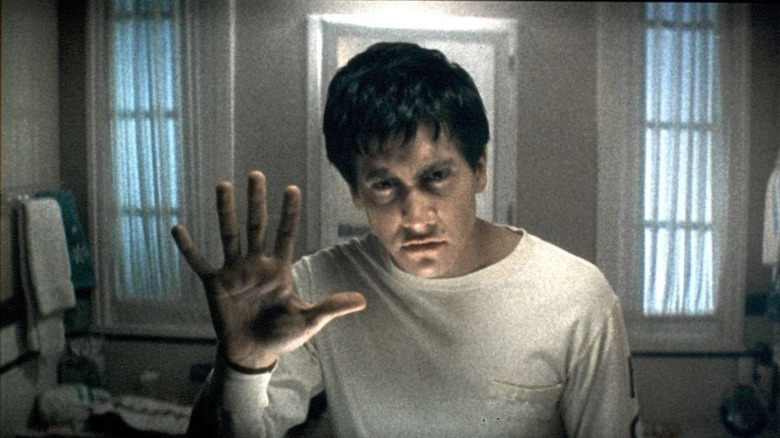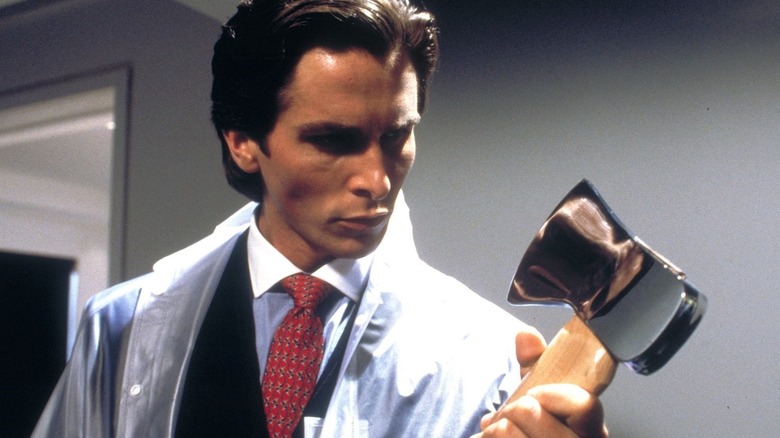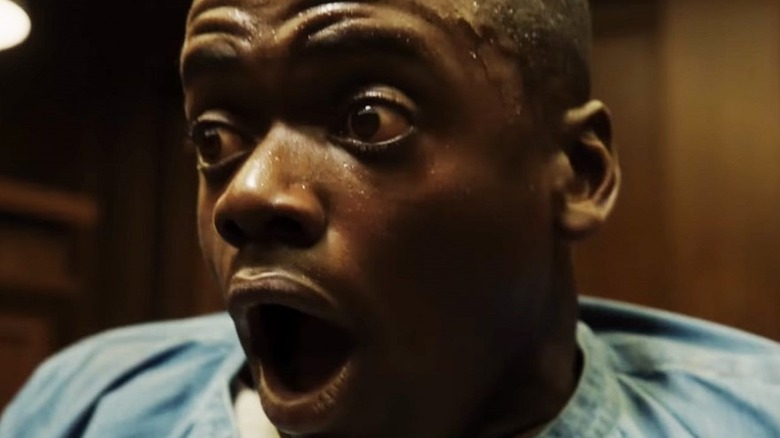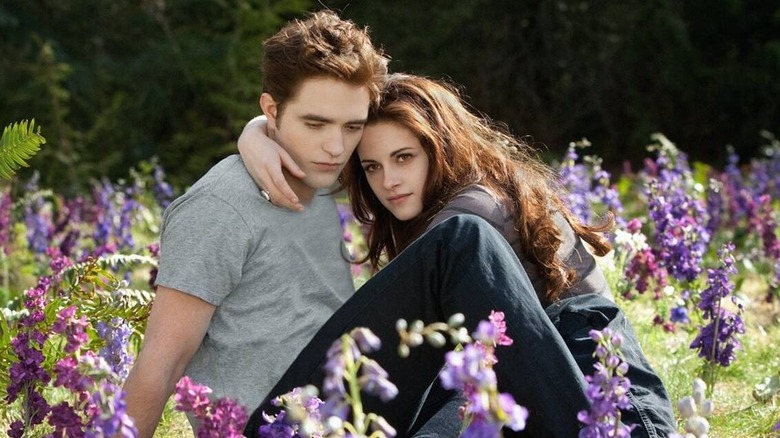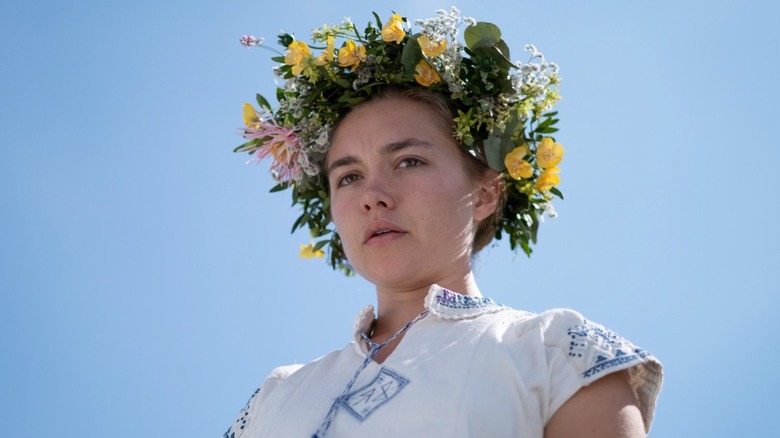Horror Movies That Made These Actors A Star
"Starring in a horror movie can't be that hard," you may think. You just run around screaming while being chased by a grown man in a Halloween costume, right? Not so fast. Starring in a horror movie tests your mettle. The budgets are usually cheap, you're paid in pizza, and the demands are more than most movie stars making six figures would endure. However, many actors — especially young actors — think it's totally worth it. Why? Because there are few emotions more pure and primal than fear. If you can make a connection with an audience in a horror movie, it can make you a star. If you're already a star, it can make you an icon.
Hollywood history is filled with numerous actors who became movie stars by starring in horror flicks. Some were complete unknowns who became cult icons or horror household names, while others were well-known actors whose signature roles came in scary pics. No, not all of these actors became "butts-in-seats" box office draws (think Tom Cruise or Sandra Bullock) after starring in horror films. However, each became famous (or infamous). In fact, many are still associated with those roles today. Continue reading (if you dare) to take a look at the horror movies that made these actors a star.
Psycho - Anthony Perkins
If you were a moviegoer in the 1950s, you probably saw plenty of Anthony Perkins' pictures. At the time, Perkins was best known as Gary Cooper's kid in "Friendly Persuasion" (for which he received his sole Oscar nomination), and as baseball player Jim Piersall in "Fear Strikes Out." However, Perkins' iconic status came from his most famous role: Norman Bates in "Psycho." Alfred Hitchcock had a stroke of genius when he cast Perkins as Bates; nobody in 1960 would have expected the boyishly good-looking Perkins to be the titular "Psycho." It'd be like casting Adam Scott or Jim Parsons as Jeffrey Dahmer, except even that wouldn't have the same effect.
Unlike audiences of today, 1960s moviegoers weren't as conditioned by cinematic sleights-of-hand, even from "The Master of Suspense." And if you're thinking, "Wait, it sounds like Perkins was already a star," the truth is, well, not exactly. He was a well-respected supporting actor in an era when Hollywood had a clear hierarchy. More than a mere movie star, "Psycho" made Perkins Norman Bates, the first slasher villain and an icon that inspired characters from Michael Myers to Hannibal Lecter.
The Exorcist - Linda Blair
Warner Bro. gave William Peter Blatty's novel "The Exorcist" the A-list treatment in the 1970s. It had a big budget for the time, $12 million, and starred Hollywood movie star Ellen Burstyn and Swedish superstar Max von Sydow. Clearly, WB wasn't trying to just make a quick buck. However, the most important part was the little girl Regan who would be possessed by the demon Pazuzu. For the role, director William Friedkin selected 13-year-old Linda Blair from a field of hundreds of applicants. Blair had only been in two movies by that point, but her performance as the head-spinning, pea soup-spitting innocent soul in "The Exorcist" scored her a supporting actress Oscar nomination — and cinematic icon status.
Linda Blair's career briefly took off after "The Exorcist," with a string of successful made-for-TV movies as well as the big-budget hit, "Airport 1975." Ironically, it was her return to Regan that killed her budding A-list career, as "Exorcist II: The Heretic" was a critical and commercial bust. While Blair didn't navigate the tricky path from child star to a grownup movie star (few have) she's still a household name, especially among horror fans, which is more than many "flash in the pan" movie stars from the 1970s can say.
Jaws - Richard Dreyfuss
Universal put a lot of responsibility on Steven Spielberg's 27-year-old shoulders. The studio gave him $12 million to film Peter Benchley's blockbuster novel "Jaws," sent him to Martha's Vineyard, and said, "Go make a movie." Think about that and try not to have an anxiety attack. Spielberg cast Oscar-nominated supporting actor Roy Schneider as Chief Brody and Robert Shaw — maybe the best supporting actor period — as shark-hunter Captain Quinn. For Hooper, the wiseass shark expert from the big city, Spielberg cast Richard Dreyfuss, best known for George Lucas' 1973 hit "American Graffiti." However, that movie was largely marketed around Ron Howard, who played Opie from the hugely popular "The Andy Griffith Show."
There have been plenty of actors who played teens in big hits who saw their careers immediately hit the skids. Why didn't Dreyfuss meet the same fate? Because he went to Martha's Vineyard to chase sharks. Post "Jaws," Dreyfuss proved he was no one-hit-wonder, as his career took off with starring roles in "Close Encounters of the Third Kind" and "The Goodbye Girl," for which he won a Best Actor Academy Award. Yes, "Jaws" made Dreyfuss a movie star, though it has to be noted that the real star to emerge from "Jaws" was arguably its director, Spielberg, who became the highest-grossing director ever.
Halloween - Jamie Lee Curtis
The first slasher "Scream Queen" was Janet Leigh in 1960's "Psycho." Alas, Leigh's character took a fateful shower and didn't survive. Seventeen years later, Leigh's daughter gave birth to a different kind of Scream Queen, the "Final Girl," in 1978's "Halloween." Jamie Lee Curtis' Laurie Strode is arguably the most famous Final Girl in the horror genre and the most bankable character in the franchise. While "Halloween" is most associated with Michael Myers, the entries starring Curtis as Laurie Strode are by far the biggest blockbusters. In fact, the only "Halloween" movie without Curtis to even break $50 million worldwide was Rob Zombie's 2007 remake.
Obviously, Curtis' Strode isn't running away from nothing, so Michael Myers is obviously essential to the series. Maybe you can think of Strode and Myers as horror movies' Hall & Oates; so-so apart, but excellent together? While Strodes' horror heroine status would land Curtis on this list alone, she also became a movie star following this part. Curtis started down the horror route with "The Fog," "Prom Night," "Terror Train," and "Halloween II," before graduating to less bloody leading parts throughout the 1980s and 1990s. Still, you just can't say "no" to legacy roles (or the paychecks), so Curtis continued returning to the role that made her a star.
Alien - Sigourney Weaver
To say Sigourney Weaver came from nowhere in 1979's "Alien" is an understatement. While she was a well-regarded stage actress, moviegoers probably only knew about her as Woody Allen's tall date in "Annie Hall." In the Alien franchise, she created one of the top 10 greatest movie heroes of all time, according to the American Film Institute. It all started in Ridley Scott's sci-fi screamer "Alien." As Lt. Ellen Ripley, Weaver emerged as the sole survivor of the USCSS Nostromo following an attack by a Xenomorph.
Weaver emerged from the film as a major movie star, too, landing above-the-title parts in the prestige pic "The Year of Living Dangerously" and blockbuster comedy, "Ghostbusters." In "Aliens," Weaver returned to her signature role and even scored an Oscar nomination. You could argue that it was Weaver's return to Ripley that had an even bigger impact on her career, as she followed "Aliens" up with career-defining and Oscar-nominated roles in "Gorillas in the Mist" and "Working Girl." However, that would be like saying "The Terminator" didn't make Arnold Schwarzenegger a star, "Terminator 2" did. It was Weaver's debut as Ripley in "Alien" that established her as a different kind of female lead, and a bonafide movie star.
A Nightmare on Elm Street - Robert Englund
Michael Myers, Jason Voorhees, and Freddy Krueger are on the Mount Rushmore of slasher-horror movie villains (there's only three because they killed the fourth). Of the three, there's probably only one actor you can name: Robert Englund as Freddy Krueger. Clearly, not wearing a mask was a good call, right? However, it isn't just that you can see Freddy's face that made Englund more memorable. Michael Myers and Jason Voorhees are the strong, silent types, basically unstoppable killing machines who hack away horny teens without emotion. In contrast, Freddy is a supernatural psychopath who takes gleeful pleasure in killing his victims. He's also kind of funny, in a "do I need therapy for laughing at this?" way. Essentially, he's a killer cartoon character whose powers in the dream world are effectively endless.
Credit Englund, whose performance made New Line Cinema, "The house that Freddy built." However, playing Freddy has been a double-edged sword for Englund. On the one (clawed) hand, he has been typecast his whole career. On the other hand ... he's freaking Freddy Krueger! Seriously, even when Englund's not donning the fedora and red sweater he still can land top billing at any fan convention in the world. Robert Englund may not sell tickets or win awards playing King Lear (though that would be pretty awesome), but as Freddy Krueger, he became a cinematic icon.
The Evil Dead - Bruce Campbell
Bruce Campbell sub-titled his book "Confessions of a B-Movie Actor," which was appropriate as Campbell's arguably the most iconic B-Movie actor ever (well, except for the one who was elected President). Honestly, Campbell is more like a D-list actor. Despite this, the dude is still a legend thanks to his defining role: Ashley Williams in the "Evil Dead" franchise, better known to fans as "Ash." While "The Evil Dead" was never as commercially successful as its horror contemporaries like "Halloween," "Friday the 13th," or "A Nightmare on Elm Street," it still inspired an uncanny cult following. "Cult" being the operative word, as it's a small, but mighty army (of darkness) that adores the gory series and its star Campbell.
It all started in "The Evil Dead," with Campbell essentially playing a gender-swapped "Final Girl" or "dude-in-distress." The film inspired an ongoing movie series and three-season TV show, most of which starred Campbell's massive-chinned mug. No, your grandmother probably hasn't heard of Bruce Campbell (unless she watches "Burn Notice" reruns), and his cameos in Sam Raimi's movies probably fly over most moviegoers' heads. But in his own way, Campbell is bigger than an A-list movie star. "The Evil Dead" made Campbell a certifiable cult movie icon with a passionate fanbase who would gladly take a bullet for him, which is more than we can say for George Clooney or Ben Affleck.
The Fly - Jeff Goldblum and Geena Davis
David Cronenberg's 1986 "The Fly" remake created two movie stars: Jeff Goldblum and Geena Davis. Before "The Fly," Goldblum was best known for supporting parts in "The Adventures of Buckaroo Banzai Across the 8th Dimension" and "The Big Chill," and lead roles in "Into The Night" and "Transylvania 6-5000." After "The Fly," Jeff Goldblum became, well, Jeff Goldblum — Hollywood's favorite eccentric, a household name with the second-most famous stammer in movie history, after Jimmy Stewart. "The Fly" transformed Jeff Goldblum from an actor into a proper noun and a brand unto himself. While you can certainly see shades of "Goldblum-ism" before "The Fly," Cronenberg's body horror reimagining of the 1958 original forever established his screen persona. Heck, it established his human persona.
However, Goldblum wasn't the only one in the family to become famous for "The Fly." There was also his then-wife, Geena Davis. Before "The Fly," Davis had a lot of TV credits and a part as a soap opera actress in "Tootsie." Her career completely transformed thanks to her bone-chilling (seriously, consider her "Be afraid. Be very afraid" line read) and heartbreaking performance. Davis followed "The Fly" up with career-defining roles in "Beetlejuice" and "The Accidental Tourist" (which won her an Academy Award), and then all-time classics "Thelma & Louise" and "A League of Their Own." Goldblum and Davis married soon after "The Fly," but filed for divorce after just three years. Of course, their respective cinematic legacies still last to this day.
The Ring - Naomi Watts
"Before you die, you see the ring" was the tagline for director Gore Verbinski's 2002 horror movie. Thankfully for star Naomi Watts' career, that wasn't the case. Watts started acting when she was 14 and took a brief detour into the fashion industry before devoting herself full-time to her acting career. She had bit parts for a decade before getting cast in the lead in David Lynch's 2001 mystery "Mulholland Drive." This performance got her noticed, but given "Mulholland Drive" was very much a surrealist Lynch movie, it wasn't exactly mainstream. Watts followed it up the next year with "The Ring," a remake of the 1998 Japanese horror film, "Ringu."
For those who don't remember, American remakes of Japanese horror films were having a moment in the early aughts, with pics like "The Grudge," "Dark Water," and "Pulse." However, "The Ring" was by far the biggest box office hit, with a $248 million worldwide gross. It also had significant cinematic staying power, based on the think pieces that followed its 20-year anniversary in 2022. Besides Verbinski going on to direct the "Pirates of the Caribbean" franchise, the biggest beneficiary of "The Ring" was Watts. She followed "The Ring" with an Oscar-nominated role in "21 Grams," as well as starring parts in blockbusters "King Kong" and "The Ring Two" (naturally). Perhaps most impressively, she became a respected thespian after starring in a horror flick, a rare feat indeed.
Donnie Darko - Jake Gyllenhaal
If you're a millennial moviegoer, chances are you have at least one friend who insists "Donnie Darko" is the greatest movie ever and will explain in agonizing detail why. Heck, maybe you are that friend. Wherever you stand on the "Donnie Darko" divide, there's no denying it made a star out of Jake Gyllenhaal. In the film, Gyllenhaal plays the titular troubled teenager Donnie, the kinda guy who could only be the sympathetic hero in a movie like this. Despite being in his late teens during filming, his wise and worldly performance anchors the oftentimes head-scratching film. To be honest, Gyllenhaal deserves more credit than he probably gets for making "Donnie Darko" digestible.
While 1999's "October Sky" was his first big lead part, and "Donnie Darko" bombed in theaters, its success on DVD sent Gyllenhaal's career soaring. Within just a few years he was starring in Roland Emmerich's blockbuster disaster pic "The Day After Tomorrow" and scoring an Oscar nomination in the groundbreaking "Brokeback Mountain." Yet, "Donnie Darko" remains Gyllenhaal's defining role. (Well, that and being the subject of Taylor Swift's "All Too Well.") You can argue "Donnie Darko" isn't actually a horror movie, but a surrealistic suburban fantasy — if so, you clearly didn't lose sleep over Frank the Rabbit. However, there's no denying that it made Gyllenhaal a movie star. If you don't believe me, just ask your "Donnie Darko"-loving buddy.
American Psycho - Christian Bale
Let's get this out of the way first: obviously, playing Batman in Christopher Nolan's "The Dark Knight" trilogy made Christian Bale a movie star. However, playing Patrick Bateman in Mary Harron's "American Psycho" made him a cult icon, and that alone warrants his inclusion. Based on Bret Easton Ellis' 1991 novel of the same name, "American Psycho" retains the novel's acerbic attitude as it satirizes 1980s excess, superficiality, and materialism. That's largely thanks to Bale, as his performance as Bateman is both funny at times and terrifying at others. He goes from making you laugh at his thoughtful dissections of Huey Lewis & the News, to making you cringe at his equally thoughtful dissections of his victims.
Everything about Bateman wreaks phony, pretentious privilege, as the only emotions he feels are vices and the only pleasure he gets comes from hurting others. Yet the one thing separating Bateman from his finance industry peers is that he kills those he sees as sub-human, instead of just dismissing them as "less than." Bale kickstarted his career at 13 in "Empire of the Sun," one of Steven Spielberg's rare bombs, then starred in "Newsies," Disney's failed attempt to revive the big-screen musical. Not much of note followed until "American Psycho," and although it did bomb, it was an instant cult classic and opened up bigger parts for Bale. He eventually landed on Christopher Nolan's radar, which clearly worked out fairly well.
Get Out - Daniel Kaluuya
Universal Pictures probably wasn't expecting much when they handed TV comedian turned writer-director Jordan Peele $5 million to go make "Get Out." They certainly weren't expecting "Get Out" to strike a raw nerve with moviegoers, leading to $252 million worldwide, an Oscar nomination for Best Picture, and a win for Peele's original screenplay. But hey, Hollywood's funny like that. As surprised as Universal might have been by the performance of Peele's picture, it's likely that the film's star, Daniel Kaluuya, was too.
Before landing the lead role in "Get Out," Kaluuya had supporting roles in "Johnny English Reborn," "Kick-Ass 2," and "Sicario." "Get Out" was his first starring role and featured him playing a boyfriend on the worst "meet the parents" weekend ever. The film earned Kaluuya an Oscar nomination, and led to major roles in blockbusters "Black Panther" and "Nope." In "Get Out," Kaluuya embodied the Black experience, creating a character who felt perpetually unsafe and threatened by the hidden motives of his seemingly genteel White hosts. At the same time, Kaluuya also gave "Get Out" a gender-swapped "Final Girl" that moviegoers worldwide could identify with and root for, no matter their race or background. "Get Out" was a cinematic experience nobody was expecting, anchored by a performance that made Daniel Kaluuya a movie star.
Twilight - Kristen Stewart and Robert Pattinson
"Twilight" is a genre mishmash of horror and romance, by way of YA melodrama — like "Underworld" for pre-teens. You can argue whether or not the franchise qualifies as "horror," but there's no denying it made stars out of Kristen Stewart and Robert Pattinson. Though, to be honest, the word "star" doesn't do them justice. For about four years, the stars of "The Twilight Saga" were the axis upon which society's pop culture turned.
You couldn't turn on a TV, open a web browser, or scan social media without seeing their gleaming, perfectly proportioned mugs staring back at you. Not since Leonardo DiCaprio and Kate Winslet in "Titanic" had two pretty young people achieved such ubiquity as Stewart and Pattinson. Unlike the stars of "Titanic," the Stewart/Pattinson thing went on for half a decade! However, like the actors of "Titanic," the stars of "Twilight" proved to be more than one-hit wonders typecast by their signature roles.
Stewart has gone on to score an Oscar nomination for her performance in "Spencer," while Pattinson played Matt Reeves' Batman and starred in Christopher Nolan's "Tenet," among other projects. The point being, before "Twilight" you'd likely never heard of Stewart and Pattinson. After "Twilight," you still can't escape them — which isn't a bad thing.
Midsommar - Florence Pugh
The 2022 "'Stepford Wives' but make it fashion" thriller "Don't Worry Darling" was the movie that really established Florence Pugh as a star. However, it was the 2019 "'Wicker Man' but lose the statue" horror movie "Midsommar" that made her one. Ari Aster followed up his 2018 A24 horror hit "Heredity" with "Midsommar," which is about a couple who travels to Sweden to take part in a famed midsummer festival, only to find themselves the unwilling victims of a terrifying pagan ritual. But hey, anything for the 'gram, right?
Following "Midsommar," Pugh's career could have easily followed the same path as countless other "pretty girl in scary movie" actresses that came before. Seriously, it's a long list. It's a testament to her talent, and her cinematically savvy selections, that led Pugh to the A-list instead. She stole the show from acting heavyweights Saoirse Ronan, Emma Watson, and Meryl Streep in Greta Gerwig's "Little Women," scoring an Oscar nomination in the process. Then, she stole the show again, this time in "Black Widow" opposite Scarlett Johansson, Rachel Weisz, and David Harbour. By the time she scored the lead in "Don't Worry Darling," she didn't need to steal anything; she was the main star. While Pugh demonstrated she had chops in 2016's "Lady Macbeth," 2019's one-two-three punch of "Fighting with My Family," "Little Women," and of course, "Midsommar," solidified her star status.
